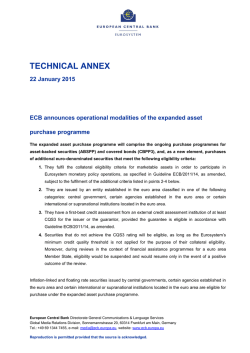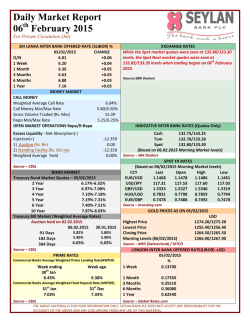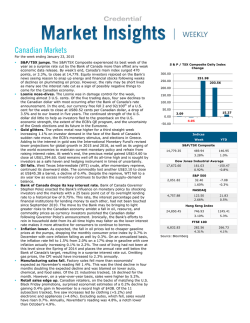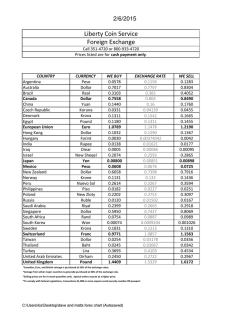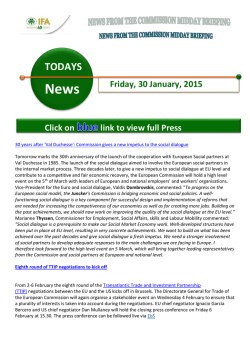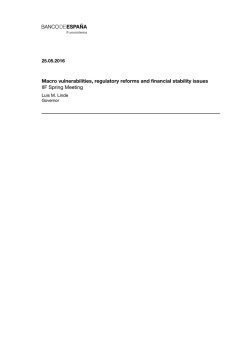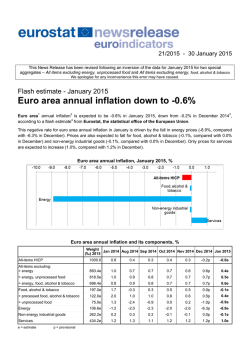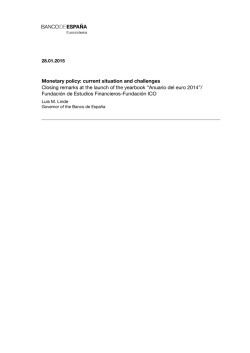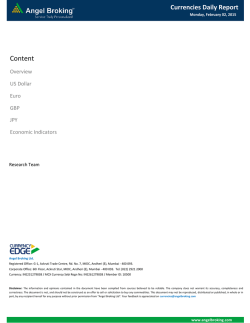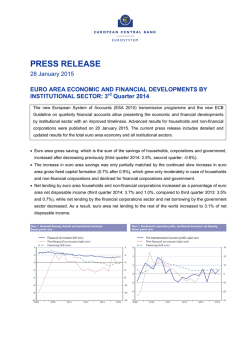
FRANK TH. ZINNECKER - HollyHedge Consult GmbH
DIPL.-KFM. FRANK TH. ZINNECKER HOLLYHEDGE CONSULT GMBH ZINNECKER MONTHLY 02 / 2015 REVIEW The year began with three drumbeats which will create more volatility in the capital markets over the course of the year. First, there was the completely unexpected decoupling of the Swiss franc from the euro resulting in a dramatic appreciation of the Swiss franc. A few days later, the ECB announced its open ended bond buying program which was higher than originally expected. And finally, the outcome of the elections in Greece with the overwhelming victory of the Left with the new Prime Minister Alexis Tsipras. This combined with the depreciation of the oil price to $ 45 and the USD appreciation against the Euro to 1.12, led to increased volatility of European bond and equity markets in January. In fact, this combination not only has shaken capital markets but also the ideas of many politicians and central bankers with regard to the economic and monetary future of their countries. Currency turbulence and falling commodity prices in conjunction with a new permanent liquidity injection by the ECB changed the playing field dramatically. It has suddenly become clear that it is a huge task to stimulate growth and get rid of the deflationary pressure. In the US, the cut in energy prices has not brought the expected consumption recovery, and Americans are questioning the consequences of the extreme dollar appreciation and how the US Federal Reserve will handle it. In the EU, the spirits are split on whether quantitative easing will help to reignite growth in the economy. The election results in Greece and the abstruse ideas with regard to the economic and social recovery by the new leadership will keep the officials in Brussels, Berlin, Paris and Frankfurt alert for the rest of 2015. OUTLOOK 2015 This development, however, has caused something positive. All the organizations involved in these processes and their protagonists have suddenly realized that the comfortable situation has come to an end. Switzerland has realized it cannot protect the exchange rate against market forces. They should have remembered the struggle of Bank of England in 1992 with George Soros. Swiss companies will now be forced to restructure their domestic business in terms of cost, but this will make them even more competitive and profitable in international markets. For the US central bank the dollar appreciation, the oil price fall and the Eurozone's sudden export benefits on global markets have become an unexpected problem. A possible rate hike might be necessary for domestic economic and labour market reasons in the summer but given the continued upward pressure of the dollar against most currencies this is not an option any more. US government bonds have appreciated in price but multinational companies are already suffering from the strong USD as we have seen in the most recent earnings reports. For the 19 EU countries, their politicians and their central bank 2015 will be the year of the destroyed illusions as finally important decisions and corrective measures in almost all areas are looming. Greece and its possible exit from the Euro is the smallest problem, because it is a country with a Holzhecke 7 – 60528 Frankfurt am Main Telefon (069) 59 79 30 31 - Fax (069) 59 79 34 40 - Mobil (0171) 79 78 174 Email: [email protected] FRANK TH. ZINNECKER SEITE 2 doubtful debt and tax morality since the 19th century and unless that changes it does not fit in the European Community. The ECB measures have become necessary to provide liquidity for the unhealthy EU banks and to protect them from a renewed collapse. The positive effects of the program on real economy as seen in the US and Britain are questionable, because there is reason to believe that the transmission system between the central bank, commercial banks and the companies no longer works effectively, as the program has not automatically led to higher loan volumes and investment. Therefore the creation of supra- national fiscal authority, among other things, responsible for the issue of EU bonds, should be promoted now as the counterpart to the ECB. There is no doubt that the commodity bear market, the euro devaluation and the new liquidity framework are powerful weapons to improve international competitiveness and the EU's revival. But this should not tempt us to move away from the promised structural reforms, especially in France and Italy. This is especially true when the politicians start to embrace an EU economic recovery plan suggested by EU Commission President Juncker, since that could possibly distract them once again to enable the necessary administrative reorganization of the EU. It cannot be the sole responsibility of the ECB to provide growth and jobs. Its primary task is to ensure monetary stability and to preserve the euro. CAPITAL MARKET OUTLOOK The current monetary and economic environment coupled with the hope that the reform process becomes more dynamic over the year should increase the positive momentum for European capital markets. We will see increased volatility caused by various worries on the political and economic front, but this is not the end of the bull market that started in 2009. Bull markets climb on walls of worry!! Hopefully the EU economy has only experienced a patch of very slow growth and will regain momentum over 2015 with rising corporate profits dividends and share buy backs. This should give the European stock market strong support. There still is room for a further multiple extension as the valuation in respect to interest rates is reasonable. Bond markets, especially at the short end will become less and less attractive and parts of that capital should find a home in equity markets. This is especially true for the European insurance industry and for German private investors, which have an exceptionally low equity exposure. Foreign investors, especially in the US, have largely withdrawn from the European equity markets due to the dollar strength and diminishing growth prospects. This could change now, if the Euro stays relatively weak and corporate profits recover even more strongly than anticipated making European stock markets in relation to the US and Asia much more attractive. 30/01/2015 Holzhecke 7 – 60528 Frankfurt am Main Telefon (069) 59 79 30 31 - Fax (069) 59 79 34 40 - Mobil (0171) 79 78 174 Email: [email protected]
© Copyright 2026

